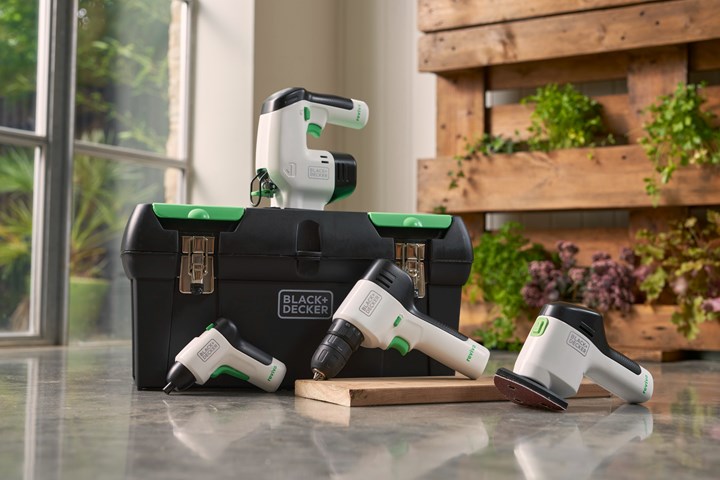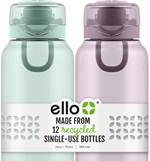Stanley Black & Decker to Use Eastman's Tritan Renew for Power Tools
With 50% certified recycled content in the enclosures, the Black+Decker reviva line will launch in early 2022.
Stanley Black & Decker announced that its Black+Decker brand will release a new product line of power tools that will utilize Eastman’s Tritan Renew copolyester. With 50% certified recycled content in the enclosures, the Black+Decker reviva line will launch in early 2022.
Engineered in partnership with Eastman, the new reviva power tools will be manufactured using Tritan Renew material produced through advanced circular recycling, also known as molecular recycling. Molecular recycling transforms single-use waste plastic into basic building blocks that are then used to make durable, high-performance materials. This process reduces the use of fossil-based resources and lowers greenhouse gas emissions while reportedly providing the performance of virgin plastic materials and environmental benefits of 50% recycled content. In addition to sustainably engineered material in this new product line, reviva packaging will be frustration-free and 100% recyclable. Stanley Black & Decker is also creating and implementing programs for battery and end-of-life tool recycling.
“Stanley Black & Decker is an iconic company known for quality and reliability in each of their brands,” said Steve Crawford, executive vice president, chief technology and sustainability officer for Eastman. “Consumers trust their products because they know they will perform, so Eastman is excited to partner and leverage our molecular recycling technologies to provide Stanley Black & Decker more sustainable materials without any compromise on product performance. This collaboration is a prime example of how value chain partners who share a vision for a sustainable future and a commitment to addressing both the climate and waste plastic issues can leverage material circularity to provide solutions with technologies we have today.”
Stanley Black & Decker aims to design products for circularity across material selection, use and end-of-life considerations, with a near-term goal of 100% reusable, recyclable or compostable packaging by 2025. In 2018, Stanley Black & Decker joined with leading businesses and governments to sign the New Plastics Economy Global Commitment, an initiative of The Ellen MacArthur Foundation and United Nations Environment Programme. Eastman is also a signatory to the New Plastics Economy Global Commitment.
“Stanley Black & Decker is continuing on its multiyear journey to extend its leadership in sustainability,” said Jeff Ansell, executive vice president of Stanley Black & Decker. “Through Eastman’s advanced circular recycling technologies we can not only make more sustainable products, but we can show the world that sustainable materials can be used anywhere, without compromising performance.”

Stanley Black & Decker’s first sustainability-led product line, reviva, utilizes Eastman's Tritan Renew copolyester and will launch in early 2022.
Related Content
-
ICIS Launches: Ask ICIS Generative AI Commodities Assistant
Said to be the first of its kind, this AI assistant will enhance access to ICIS’ intelligence and insights for the energy and chemical markets.
-
Fungi Makes Meal of Polypropylene
University of Sydney researchers identify two strains of fungi that can biodegrade hard to recycle plastics like PP.
-
PHA Compound Molded into “World’s First” Biodegradable Bottle Closures
Beyond Plastic and partners have created a certified biodegradable PHA compound that can be injection molded into 38-mm closures in a sub 6-second cycle from a multicavity hot runner tool.









